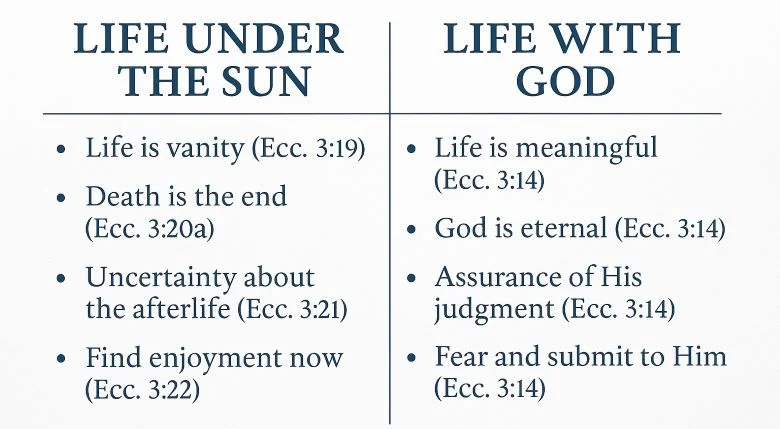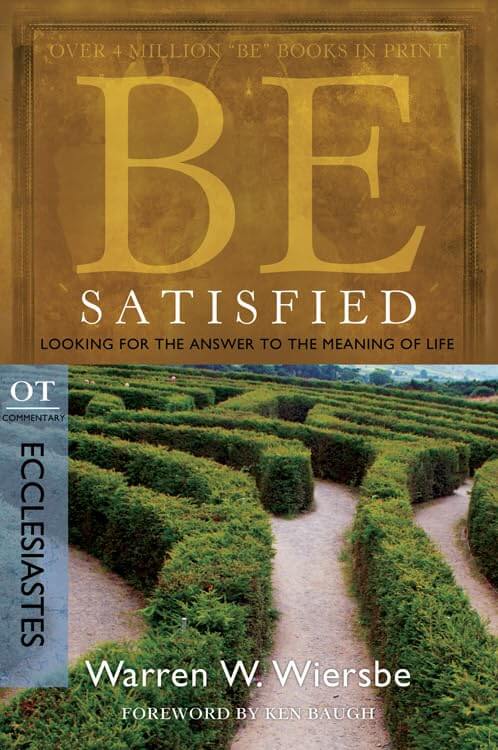
Ecclesiastes 3 is one of the most quoted and cherished passages in Scripture, by both believers and unbelievers alike. Its poetic rhythm speaks of life’s seasons with unmatched honesty and wisdom.
But why has this passage captivated hearts across centuries and cultures? What deeper truths was Solomon, the author, trying to convey about the human experience?
Let’s take a closer look at Ecclesiastes 3 and discover what it reveals about God’s sovereignty, human longing, and how we can find joy and meaning in life’s ever-changing seasons.
A Brief Introduction to the Book of Ecclesiastes
While some scholars suggest Ecclesiastes may have been written by someone other than Solomon, the evidence strongly supports Solomon as the author. The writer identifies himself as “the son of David, king in Jerusalem” (Ecclesiastes 1:1, 12), which matches Solomon’s identity perfectly.
Solomon had the wisdom, wealth, and experience described throughout the book (see Ecclesiastes 2:1-10; 1 Kings 4:29-30). He was uniquely qualified to explore life’s greatest questions, and Ecclesiastes reflects a tone of reflection likely penned in his later years—around 935 B.C.—when Israel’s golden age was beginning to fade.
The Hebrew name for the writer is Qoheleth, meaning “Preacher” or “one who addresses an assembly.” This gives us a clue about the book’s purpose: it is a thoughtful message from a wise teacher to God’s people, urging them to consider what truly matters “under the sun.”
A Time for Everything (Ecclesiastes 3:1-8)

“For everything there is a season, and a time for every matter under heaven…”
— Ecclesiastes 3:1 (ESV)
In fourteen poetic pairings, Solomon describes the rhythm of life: a time to be born, a time to die, a time to weep, and a time to laugh. These phrases beautifully capture the reality that God is sovereign over every moment, even those we don’t understand.
Let’s reflect on a few of these life seasons and what they mean:
? A Time to Be Born and a Time to Die (v. 2a)
In our modern world, advancements in medicine and debates on abortion, euthanasia, and reproductive technology might give the illusion that we control life and death. But Solomon reminds us that both birth and death are not accidents—they are divine appointments.
God alone determines the span of our lives. We may try to hasten or delay death, but unless He wills otherwise, we cannot alter His plan (see Isaiah 38:1-8, Hezekiah’s extension of life).
? A Time to Plant and a Time to Harvest (v. 2b)
Farmers understand this principle well: you can plow and sow, but only God brings the growth (Psalm 65:9-13). The same is true in our lives. When we align with God’s timing and purposes, we’ll see fruit—not always instantly, but always faithfully.
? A Time to Cast Away Stones and a Time to Gather Stones (v. 5)
In ancient Israel, stones could hinder or help. They could be obstacles in a field or tools for building. Even today, the “stones” in our lives—our struggles or burdens—can either become stumbling blocks or stepping stones, depending on how we use them.
If someone throws stones at you, don’t throw them back. Build something with them.
? A Time to Tear and a Time to Sew (v. 7)
This reflects the Jewish custom of tearing garments during mourning or repentance (Ezra 9:5; 2 Samuel 13:31). Grieving is natural, but it must be followed by healing and restoration. There comes a time to pick up the thread again and move forward in faith.
? A Time to Love and a Time to Hate (v. 8)
God’s people are called to love, especially our enemies. Yet Scripture also teaches us to hate what is evil (Romans 12:9). Solomon may have been referring to national matters like war and peace, but the principle applies: love what God loves, and hate what He hates (see Revelation 2:6, Proverbs 6:16-19).
The key takeaway from this famous section? Trust God’s timing. As Ecclesiastes 3:11 says, “He has made everything beautiful in its time.”
? Making Sense of God’s Gift: Life Itself (Ecclesiastes 3:10-13)
“I have seen the business that God has given to the children of man to be busy with…” (v. 10)
Solomon honestly admits that life can feel burdensome. But he also calls it a gift from God. If we accept life with gratitude, even when we don’t fully understand it, we will find peace. If we resist it, we’ll only increase our frustration.
As Bible teacher Warren Wiersbe once said, “Outlook helps to determine the outcome.”
? Eternity in Our Hearts (Ecclesiastes 3:11)
“He has put eternity into man’s heart…” (v. 11)
This is one of the most profound statements in Scripture. God created us in His image (Genesis 1:26-27), and within each of us is a deep longing for eternity. No earthly thing can fill that void—only God can.
Missionary Don Richardson used this phrase, “eternity in their hearts,” to describe how many indigenous cultures already possess redemptive analogies that point to the gospel. God has placed glimpses of truth in the hearts of people everywhere—because we are created to seek Him.
? Enjoyment, Not Escapism (Ecclesiastes 3:12-13)
Solomon isn’t promoting mindless pleasure or self-indulgence. Rather, he’s teaching us to enjoy the good things God gives, even in a broken world. Hard work, family, food, and simple pleasures are not meaningless—they are gifts from God to be received with gratitude (1 Timothy 6:17).
When we stop striving and start trusting, we begin to see beauty even in ordinary days.
? Living with Reverence (Ecclesiastes 3:14)
“God has done it, so that people fear before him.”
To “fear God” isn’t to cower in terror, but to live in humble awe and joyful submission. It’s the reverence of a child toward a loving Father. As Proverbs 9:10 says, “The fear of the Lord is the beginning of wisdom.”
When we understand that God is in control, we can rest—even in uncertainty.
? God Holds Time in His Hands (Ecclesiastes 3:15)
“That which is, already has been; that which is to be, already has been; and God seeks what has been driven away.”
This reminds us of Ecclesiastes 1:9—history often repeats itself. But that doesn’t mean we’re stuck in a meaningless cycle. God can break into time and do something new (Isaiah 43:19). The cross and resurrection are proof that He intervenes with purpose.
? Humans and Animals: The Same End? (Ecclesiastes 3:18–21)

Solomon reflects honestly on the fate of humans and animals. From a purely earthly perspective, both die and return to dust. But he also acknowledges that God is testing and sifting people, revealing what’s in their hearts.
While the Preacher may not have seen the full picture, we know from the New Testament that eternity does await (John 5:28–29). The resurrection of Jesus guarantees that our destiny is not the same as animals—we are made for eternal life.
? Enjoy Today, Trust God with Tomorrow (Ecclesiastes 3:22)
Solomon’s final encouragement in this chapter is simple yet profound: live each day as a gift. We don’t know what the future holds, but we can choose to enjoy the present, grow in godliness, and trust God’s plan.
As Paul wrote in Philippians 4:11,
“I have learned in whatever situation I am to be content.”
The Message of Ecclesiastes: Life Without God is Vanity
The recurring theme in Ecclesiastes is the vanity of life apart from God. Solomon’s search for meaning—through wisdom, pleasure, wealth, and success—only led to frustration when God was left out of the equation.
The phrase “under the sun” appears 29 times, underscoring the earthly perspective. But the solution is not in cynicism or despair—it’s in looking above the sun, to the One who made it.
Conclusion: Beauty, Eternity, and Hope
Although life is fleeting, and time seems short, Ecclesiastes reminds us that God has made everything beautiful in its time (Ecclesiastes 3:11). Beauty isn’t just a pleasant feeling—it’s a window into eternity. It awakens in us a longing for something more… someone more.
Whether it’s the splendor of creation, a child’s laughter, or a quiet moment of peace, these glimpses remind us that we were made for a greater purpose: to know and glorify God.
So today, embrace your season. Trust God’s timing. Enjoy the gifts He’s given. And remember, no matter how confusing life gets under the sun, everything becomes clearer when we live under His grace.
As an Amazon Associate, I earn from qualifying purchases. This means that if you click on an affiliate link and make a purchase, I may receive a small commission at no extra cost to you. Thank you for supporting Biblical Christianity!
Recommended Resource:
Looking for a deeper perspective on the themes of meaning, purpose, and satisfaction in life—just like Solomon explored in Ecclesiastes? This powerful resource offers fresh biblical insights on what truly satisfies the human heart.
Be Satisfied: Looking for the Answer to the Meaning of Life
By Warren W. Wiersbe
Discover the keys to having a satisfied life. King Solomon had it all—wealth, power, prestige. Yet despite having everything he could ever want, Solomon was still unsatisfied. He soon came to a startling conclusion: Even if we have it all, it is never enough.

